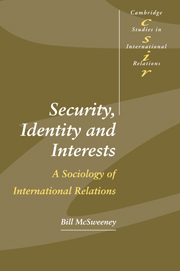Book contents
- Frontmatter
- Contents
- Acknowledgements
- Introduction
- 1 The meaning of security
- Part I Objectivist approaches to international security
- Part II Theorizing security: the turn to sociology
- 5 A conceptual discussion
- 6 The social constructionist approach
- 7 The limits of identity theory
- 8 Agency and structure in social theory
- 9 Seeing a different world: a reflexive sociology of security
- Part III Practising security
- Bibliography
- Index
- CAMBRIDGE STUDIES IN INTERNATIONAL RELATIONS
9 - Seeing a different world: a reflexive sociology of security
Published online by Cambridge University Press: 22 September 2009
- Frontmatter
- Contents
- Acknowledgements
- Introduction
- 1 The meaning of security
- Part I Objectivist approaches to international security
- Part II Theorizing security: the turn to sociology
- 5 A conceptual discussion
- 6 The social constructionist approach
- 7 The limits of identity theory
- 8 Agency and structure in social theory
- 9 Seeing a different world: a reflexive sociology of security
- Part III Practising security
- Bibliography
- Index
- CAMBRIDGE STUDIES IN INTERNATIONAL RELATIONS
Summary
To see how the framework of the last chapter applies to the topic of security and, through security, to the concepts of identity and interests, it is useful to return to the question of agency and to ‘mutual knowledge’ as its condition. The argument is that we can only understand how international security can be meaningfully grounded in and organized for individuals by first understanding the security impulse in the individual, who stands as its ultimate point of reference.
Individual concerns with security are diverse with respect to the differential interests arising from material possessions, institutional commitments and the threats and vulnerabilities to which they are exposed. From this point of view, the majority of poor and isolated have less to secure. All can be recruited to the general cause of collective security more legitimately by identifying the level at which a common interest, arising from a common need, can be located.
The language of needs, and the idea of a hierarchy of human needs, plays a significant part – often implicit – in theorists' accounts of the motivation of action and the sources of conflict. The plausibility of a hierarchic table of human needs, with physical survival in the highest rank, helps to legitimize the allocation of resources to the means best suited to ensure it.
Information
- Type
- Chapter
- Information
- Security, Identity and InterestsA Sociology of International Relations, pp. 152 - 172Publisher: Cambridge University PressPrint publication year: 1999
